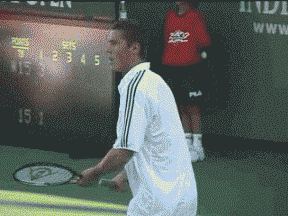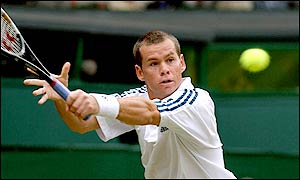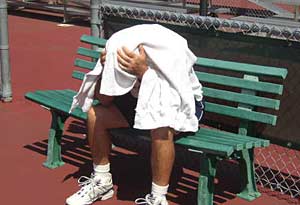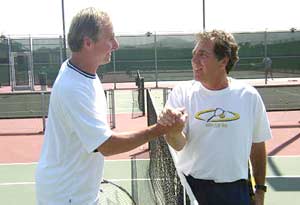<% ns_puts [mkm_getnavbar] %>
Loneliness to Fearlessness
|
|
So much has written about the importance of winning and the joy of it. We seek this feeling, never seem to get enough of it, and are continuously compelled to ask or answer the relentless first post-match question following virtually every match played, “How did you do? Did you win?”
Now, just for the record, let me be clear about my belief regarding this pervasive quest. Winning does feel very fulfilling. It is also an important barometer to measure our progress and hard work. Winning creates tension but it also makes the game exciting. For some, it earns them a living. Clearly, it has its place.
However, it’s my strong belief that the final frontier toward truly fearless tennis lies in our ability to balance its polar opposite—losing. We’ve all witnessed people who have lost and have felt it ourselves. Let’s face it; we know the feeling of playing "not to lose." We have found ourselves protecting against this mini-tragedy, its pain, the ensuing loneliness of it, even projected ourselves into the future, post-match assault, “Did you win?” again and again.
|
|
And few other sports bring out
this anxiety like tennis. In baseball and football, you have the team to
take comfort in. Golf is played against the course. But tennis is
combative, not unlike boxing. You’re out in the open, alone and very much
exposed,
there really is no place to hide. It can be one-on-one assault on the ego and
that’s what brings out the negativity and frustration and makes losing so
painful. But it's also what makes tennis such a great game.
We can all relate to the tension that creeps in while leading—God forbid
we should actually squander a lead and lose—because the pain here is that
much worse. After all, we were almost “there"—we were so close.
The words are played over and over again, “I could have, if only, what if….” If we’re honest, most of us experience great pain in this mind-set, one that has caused me heartache and contributed to sub-par performances throughout my own career. There is a great deal of anguish and pain in this when winning is used to bolster our self-esteem, even our plight in life. Believe me, the line can get awfully blurry sometimes.
I have to continually re-align myself to the right perspective because I, too, know the pain in the short-term, very narrow-minded frame of mind. Take my match against Scott Draper, a top 50-player for a number of years (he just reached the 3rd round of Wimbledon for the second year in a row).
|
|
Two years ago at the Siebel Open in the first round of qualifying, I was serving for the match at 5-3 in the third set. Here, I let up for just a moment—enough for a top player like this to inch his way back—and ended up losing 7-5 in the third.
My first thought after this match was, “If only I could have won that game, then….” I suffered for a few hours and then my second thought kicked in, “ That was the most fun I’ve had on the tennis court in my 25 years in the game.”
Suffice it to say, my experience and memory of this
match now creates more joy than despair. The key is for us to get to that
second thought. Feeling the pain of the loss for a short time to get the
lesson can be key, but once you’ve got it, move on quickly. Otherwise,
this is where the pain and anguish lie.
In my private practice often what I find my clients (competitive league players, juniors, college players, even pros) experiencing after a loss are disappointment in a “lost opportunity,” frustration and anger of not performing to their expectations, diminished self-worth, and a blow to their self-image. Many club players, for example, feel enormous social pressure to win—for themselves and the team—to maintain a positive image and opinion by others.
This pressure “chamber” is reinforced constantly and is the unspoken distraction and fear that is the cause of many performance failures. This external pressure coupled with our own personal need to succeed and be worthy creates an even more tension-filled environment than many pros deal with.
|
Want to study the incredible
weapons of the great players in tennis? Over 1,000 strokes to study! Click here now to become a member. |
Top pros have learned to manage these potential external distractions by focusing more on what they have control over. Image among peers and self-worth are “irrelevant” during match play. Club players need to realize this reality more and more if they want to break out of this pressure-filled chamber and illusion that winning will buy them more self-worth. The truth is, the more success you have the more you need to keep the image alive. In this system, we’re never free.
While all of these reactions are seemingly normal given our attachment to success as a reflection of who we are, they create tremendous tension, anxiety and diminished enjoyment in the game. This layer of “baggage”, which has been created out of our attachment and unconscious need to feel worthy and receive external validation, causes us to play in fear and actually sabotages our success in the long run.
|
|
Letting go of this attachment is definitely a process of understanding how much pressure we’re placing on ourselves, the inner dialogue that is running in the moment, and getting to a point of wanting to try something new. Wanting to experience the game on a different level—one that is primarily associated with feeling good and playing fearlessly—is mandatory for this shift to take place. In other words, whether we miss the ball, even lose, but go for our shots under pressure and manage our emotions in the moment, we will win the longer battle--reaching our full potential.
Many elite athletes have seemed to find an inner drive and determination—and, incidentally, a strong distaste for losing—that have driven them to greater heights. It’s my belief that the supremely talented can do this successfully. They can train harder, maintain a single-minded focus on their goal—often bordering obsession—and ultimately achieve, even win more.
For most of us, the pain, the loneliness, and self-defeating
behavior (negativity, frustration, anger, tentative play) only keep us
stuck. We may work harder and even experience the illusion of progress in
our practice sessions, but we will continually be haunted when it counts
most. Out of our fear of losing comes the loss of the “process”—all the
aspects of the performance that actually help us win more.
The answer, from my perspective, as I continue to learn day after day,
resides in our courage to stare at this bogie man in the face. When we
accept losing as a possibility, embrace the tension between its brother,
winning, without hiding, protecting, fearing, and shrinking from the
moment before us, we will be free.
For me, much of my personal breakthrough over the past few years that has taken my game to its highest level ever is this more balanced perspective on winning and losing. I no longer need to protect and play so conservatively because I accept the consequences of my actions. I have prioritized the feeling of hitting the ball and the joy this brings me over the result, which has made all the difference.
|
|
In other words, I have
learned to thrive more on the “process” of competition and challenging
myself to compete at my highest level. I now respect and cherish each
opportunity before me - producing my best under pressure, staying focused
on the task regardless of the circumstance, rising up to the challenges
presented to me. This does not mean that results no longer matter...but
the moment-by-moment experience and thrill of challenging myself plays the
larger role.
What does this look like in action? We carry ourselves more confidently.
We worry less and focus more on what is “relevant” in the moment. We focus
on the ball like never before. We breathe. We stay connected to our body
and get out of our head. We trust. We have fun. We love hitting the ball.
We’re clear about our strategy and have courage to execute it at will.
There are often many roads to the same destination. Perhaps shifting to
the perspective of thriving more on the pressure before us at any given
moment, truly embracing this opportunity with the most courageous aspect
of ourselves to play the right shot at the right time is the answer.
Perhaps part of this process is merely to come to terms with our fear of
losing and what this really means to us is the answer to finally freeing
ourselves from the grips of these polar opposites.
Either way, I am
convinced that if we can all continue to move deeper into a state of mind
and body that exists beyond the result of our efforts from shot-to-shot,
we will find more joy than ever before. The lonely edge we once knew so
intimately will finally be smoothed out. Ironically, once we do this,
we’ll actually win more…. Victor Frankl, in Man’s Search for Meaning had
this to say about freedom, “The definition of freedom is feeling as though
you have nothing to lose.” Ultimately, when our deepest vision shifts
toward a greater desire to go for our shots, playing authoritatively under
pressure, and relishing every shot and the drama beyond simply the win or
loss, we will be free.
TennisONE is an informational and instructional Website. Your feedback is important to us. Let us know what you think and what you’ve learned by emailing us here at TennisONE.
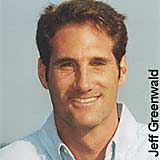
Jeff Greenwald was ranked #1 in the world in singles in the men’s 35 age division and #1 in the United States in doubles in that age division by the International Tennis Federation and the United States Tennis Association respectively in 2002.
In 1997, he was the #1 ranked tennis player in Northern California and
was named Player of the Year by the USTA. Earlier, Jeff earned a world
ranking as a touring professional (he is still ranked on the ATP
computer), competing in numerous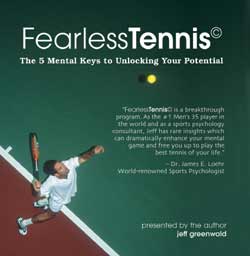 tournaments on seven continents.
tournaments on seven continents.
Jeff trained as a youth with John Austin and the late Tim Gullikson. He continues to compete in professional tennis tournaments worldwide, employing and testing the techniques and behavior patterns he teaches in classrooms, boardrooms, and on the playing fields.
Jeff holds a Master's Degree in Clinical and Sports Psychology, is a USPTA certified tennis professional, and is a member of the National Speakers Association. He is the author of FearlessTennis: The 5 Mental Keys to Unlocking Your Potential.
Readers are encouraged to email their thoughts to the author at jgedge@attglobal.net.
To contact us, please email to: webmaster@tennisone.com
TennisONE is a registered trademark of TennisONE and SportsWeb ONE; Copyright 1995. All rights reserved.


